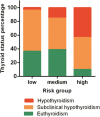Endocrine Evaluation in POEMS Syndrome: A Cohort Study
- PMID: 33193075
- PMCID: PMC7654174
- DOI: 10.3389/fendo.2020.536241
Endocrine Evaluation in POEMS Syndrome: A Cohort Study
Abstract
Endocrinopathy is an important characteristic of POEMS (polyneuropathy, organomegaly, endocrinopathy, monoclonal gammopathy, and skin changes) syndrome. However, endocrine responses to different regimens were unknown so far. Here we investigated endocrine characteristics in 383 patients with newly diagnosed POEMS syndrome and thyroid responses 1 year after treatment with autologous peripheral stem cell transplantation, melphalan plus dexamethasone, or lenalidomide plus dexamethasone. Overt hypothyroidism and subclinical hypothyroidism were noted in 20.6% (79/383) and 36.0% (138/383) of patients. Adrenal insufficiency was noted in 13.6% (43/316) of patients. Hyperprolactinemia was noted in 62.7% (207/330) of patients. Hypogonadism was noted in 48.0% (60/125) of female and 22.6% (51/226) of male patients. Thyroid function was significantly related with baseline risk stratification (p < 0.001) and significantly improved regardless of initial regimens. Patients with baseline hypothyroidism had a significant inferior progression-free survival (PFS) (p = 0.028) and overall survival (OS) (p = 0.006). Three-year PFS in patients with and without baseline hypothyroidism were 68.9 vs. 82.5%, respectively. Three-year OS rates in patients with and without baseline hypothyroidism were 82.8 vs. 92.8%, respectively. In summary, hypothyroidism, hyperprolactinemia, and hypogonadism are common endocrinopathies in POEMS syndrome. Thyroid function significantly improved regardless of the initial regimens. Thyroid function parallels with baseline risk stratification, and patients with baseline hypothyroidism have significantly inferior OS and PFS.
Keywords: POEMS syndrome; endocrinopathy; overall survival; risk stratification; thyroid response.
Copyright © 2020 Yang, Zhao, Gao, Huang, Cao, Zhou, Xia and Li.
Figures






Similar articles
-
Improvement of thyroid function in POEMS syndrome after combination therapy of lenalidomide and dexamethasone.Leuk Lymphoma. 2019 Feb;60(2):483-487. doi: 10.1080/10428194.2018.1485909. Epub 2018 Nov 8. Leuk Lymphoma. 2019. PMID: 30407096 Clinical Trial.
-
Prevalence and Course of Endocrinopathy in POEMS Syndrome.J Clin Endocrinol Metab. 2019 Jun 1;104(6):2140-2146. doi: 10.1210/jc.2018-01516. J Clin Endocrinol Metab. 2019. PMID: 30239770
-
Improvement of sexual function in POEMS syndrome after combination therapy of Lenalidomide and dexamethasone.Orphanet J Rare Dis. 2016 Jun 18;11(1):80. doi: 10.1186/s13023-016-0461-8. Orphanet J Rare Dis. 2016. PMID: 27317315 Free PMC article.
-
Endocrine Manifestations in POEMS Syndrome: a case report and literature review.BMC Endocr Disord. 2019 Mar 22;19(1):33. doi: 10.1186/s12902-019-0355-6. BMC Endocr Disord. 2019. PMID: 30902082 Free PMC article. Review.
-
[Rapid improvement of fluid retention with lenalidomide plus low-dose dexamethasone for POEMS syndrome relapsed after autologous peripheral blood stem cell transplantation].Rinsho Ketsueki. 2013 Jul;54(7):670-4. Rinsho Ketsueki. 2013. PMID: 23912352 Review. Japanese.
Cited by
-
Case report: DKRd regimen in the treatment of newly diagnosed POEMS syndrome and literature review.Front Oncol. 2024 Aug 1;14:1417380. doi: 10.3389/fonc.2024.1417380. eCollection 2024. Front Oncol. 2024. PMID: 39148901 Free PMC article.
-
Unraveling Polyneuropathy, Organomegaly, Endocrinopathy, Monoclonal Gammopathy, and Skin Changes Syndrome: Diagnostic Challenges and Therapeutic Strategies at a National Tertiary Care Center.Cureus. 2024 Dec 12;16(12):e75620. doi: 10.7759/cureus.75620. eCollection 2024 Dec. Cureus. 2024. PMID: 39803068 Free PMC article.
References
Publication types
MeSH terms
Substances
LinkOut - more resources
Full Text Sources
Medical

